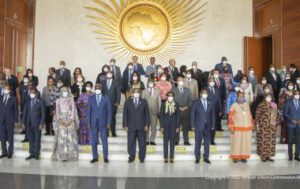Amb. Joseph Sacko, Commisioner for Agriculture, Rural Development, Blue Economy and Sustainable Environment (ARBE) on Thursday stressed the need for building resilient food systems in Africa in the post Coronavirus (COVID-19) era.
Sacko said this at the virtual inaugural briefing within the framework of the ongoing 35th Ordinary Session of the AU-Summit, which started from Feb. 2 to 3, in Addis Ababa, Ethiopia.
She explained that ARBE comprises two directorates namely: the Directorate for Agriculture and Rural Development, as well as Directorate of Blue Economy and Sustainable Environment in the department of the AU.
According to her, the directorates work closely to build nexus and resilience on human capital, so as to tackle the invisible enemy, in form of COVID-19 being faced globally.
“We have a nexus of conflict, climate change and hunger on the continent; this is a reality that is happening in our continent and we have to address food insecurity collectively.
“Both at the regional level and at national level, so that we can mitigate all effects of conflict, hunger in Africa and climate change issues.
“Immediately business activities stopped in March, 2000 we reflect on ways to avoid sanitary crises that affected food security and looked at impact of the pandemic on all sector of the economy.
“We also called for meetings on ways to mitigate impact of the pandemic, because most of the industries were paralysed, people were at home, in their bid to prevent themselves from contamination.
“We also called for ministerial meetings and also held meeting our partners in the bid to mitigate hunger as a result of COVID-19 in Africa and ensure our cities still has access to food,” Sacko said.
She mentioned that before COVID-19, there were 250 million people under-nourished as a result of hunger, saying the spread of the virus resulted in additional 40 million people.
She disclosed that as of the time of filing this report, there are about 270 to 280 million people living with hunger across the continent due to COVID-19.
She decried failure by African governments to invest adequately in agriculture as a mainstay of their economy in a bid to tackle the problem of malnutrition in the continent.
“This is a poor child of the economy, African governments sores not invest in Agriculture and we have this challenge, whereas agriculture is he backbone of the African social economy.

“We cannot have 70 per cent of our population been ruled out and practicing agriculture to feed our people and we are receiving investment on the sector.
“So that is why we called on the Ministers of Agriculture and we had a second ministerial meeting, which is the tripartite ministerial conference with the Ministers of Agriculture, Trade and Finance.
“We came out also with a very substantive declaration, in order to speed up all of these,” she added.
She also attributed success so far recorded in efforts to end hunger to organised food system summit and evaluation of implementation of the seven commitment of Malabo declaration on ending hunger.
Meanwhile, she noted that although remarkable progress had been recorded in the area of climate change, however paucity of funds posed obstacle in the bid to achieve set targets green recovery plans.
“We have the Paris Agreement and we are going forward in the implementation of goals, but lack of financing is the core challenge that our Member States are facing.
“Some governments spend 2 to 5 per cent of their national budgets on adaptation; Africa has 4 per cent of pollution in comparison to Brazil, U.S., China, India and the EU.
“So that does not mean we do not have much responsibility, it does not mean that we are not part of the planet, but which type of planet are we going to give to our children.
“This is reason we focus on adaptation in agriculture, because we need to feed, if you look at the effect of climate change, it is mostly on agriculture,” the commissioner said.
She said strategic steps had been put in place to achieve the Green Recovery Action Plan and Progress towards operationalisation of the Multi Hazard Early Warning Systems for Early Action in Africa. (NAN)